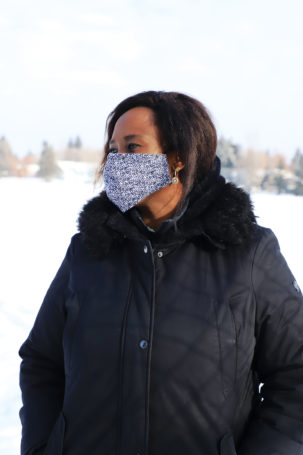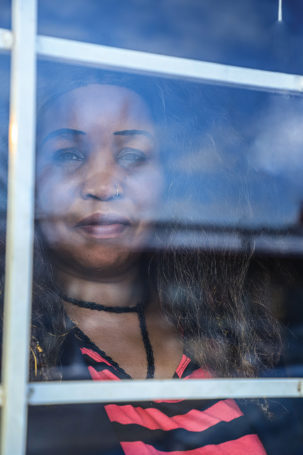April 5, 2021
Edmonton’s South Sudanese community adapts to their new home in a most challenging time
April 5, 2021
Edmonton’s South Sudanese community adapts to their new home in a most challenging time
Do you fear contracting COVID-19 at work and bringing it home to family members? Are your kids adjusting to online learning? Do you have to manage child-care issues? Have you lost your job? Are you struggling to pay your rent or mortgage? Are you battling depression or other mental disorders triggered by social isolation?
You’re not alone.
“Not only has COVID exposed the underlying problems that our community faces,” says Dr. Mawien Akot, a South Sudanese physician residing in Edmonton, “but it has magnified them. Sadly, one of our community leaders died in February.
“In July alone, we lost six people. In September, we lost five and just a few days before the end of 2020, three more lives just perished. Some of these deaths, though not directly COVID-19-related, have been expedited by pandemic-related stressors, but mostly youth under 30 so far.”
People from South Sudan arrived in Edmonton as landed immigrants in the early 1990s from countries that hosted them as refugees from the Second Sudanese Civil War. Today, Edmonton is home to more than 5,000 people from South Sudan. Alberta alone houses almost 30,000, the largest South Sudanese Canadian community in the country, says Deng Akol, a community leader who, at the University of Calgary, studied Alberta’s South Sudanese cultural dilemmas. Here, many South Sudanese work in nursing homes and meat-packaging plants. These were severely impacted by COVID-19.
“In addition to being essential workers, some community members live in compact housing to shield their relatives or friends who have no place to live, which creates a conducive environment for spreading the virus among the community at the highest speed,” says Dr. Akot.

Asha Anihiri A., a South Sudanese Canadian, is an independent researcher and senior policy analyst with the Government of Alberta. “Like everybody else, we are stuck at home,” she says about the pandemic. “In March, when the country started to restrict gatherings to help limit the spread of the virus, it was so confusing especially among South Sudanese, who are a community-oriented people. It has been tough not to celebrate our children’s birthdays, to not spend time with our friends, and not to support our community during sickness and death.”
Nyadauol Gach, a small-business owner and single parent of five, tells how her business has slowed down since the pandemic. “I understand, because of this virus, many people do not have money, so I am losing some of my customers,” she says. Gach’s shop sells a wide variety of items including “things you can’t find in any average Canadian stores.” She sells food from African and Middle Eastern countries, beauty products, as well as Islamic and African clothes for women and men.

Atoj Deng is a medical assistant, completing her bachelor’s degree in healthcare management from the National American University in Rapid City, South Dakota. Deng was already studying online from her home in Edmonton, but has been experiencing cuts in her paycheque due to reduced working hours. However, she is more concerned about kids in her community.
“I noticed in our [Sudanese] community that many kids’ performance at school has suffered especially because of the remote learning and language barrier,” Deng says. “It’s hard for some parents to help their children with schoolwork and especially with online learning.” Many community members speak good English, but it is a different story when helping children with schoolwork.
Community and local organizations including Edmonton Community Foundation (ECF), Multicultural Health Brokers Co-op (MCHB) and Edmonton Mennonite Centre for Newcomers (EMCN) play key roles in supporting members of the community. ECF, for example, funded some of the burial costs of those who died of COVID-19. Usually, the South Sudanese community collects money to support the family that lost their loved one, but many are dazed by the number of deaths in such a short time — and the financial strains created as a result.
The MCHB is currently supporting 23 senior citizens from the community with food items and prepaid cell phones to help prevent additional social isolation. The MCHB also provided gift cards to purchase food and helps those who need special diets due to chronic illnesses like diabetes. Similarly, the EMCN assists in housing and the Multicultural Family Resource Society is helping community members facing eviction.
While it is important to focus on financial needs during the pandemic, mental health also deserves more attention than ever. The World Health Organization (WHO) reports that “[because of the pandemic] and given past experience of emergencies, the need for mental health and psychosocial support will substantially increase in the coming months and years.”
Anihiri A. agrees. “Mental health is not dealt with well in our communities because it is still a stigmatized topic, even though we have gone through years of wars that have left many traumatized,” she says. “Yet, we still don’t accept mental illness as a real thing. If people are made aware that it’s an illness like any other physical condition, people will take it seriously and stop treating it as a personal failure.
“Mental health must be addressed based on an informed and cultural way of different ethnic groups in the country because this one-size-fits-all approach does not work for everybody or every community and, certainly, not our community.”
There is also a structural component that prevents South Sudanese people from getting treatment: A study by the University of Alberta found that Black youth in Edmonton have difficulty getting the support they need for mental-health problems. A similar study conducted in Ontario revealed that COVID-19 has disproportionately affected racialized minorities and those who live in low-income neighbourhoods in that province. Kwame McKenzie, CEO of the Wellesley Institute and a psychiatry professor at the University of Toronto, told CBC: “Some people thought that COVID would be the great equalizer. COVID-19 is not a great equalizer — it discriminates.”
Anihiri A. and Akot agree that assisting communities begins by understanding their dynamics, values and cultural contexts. South Sudanese are community-based, live based on collaboration, and need language and skills training to access sustainable jobs, affordable housing, psychologists and resources to help with traumas and mental illnesses, while at the same time addressing systemic racism.